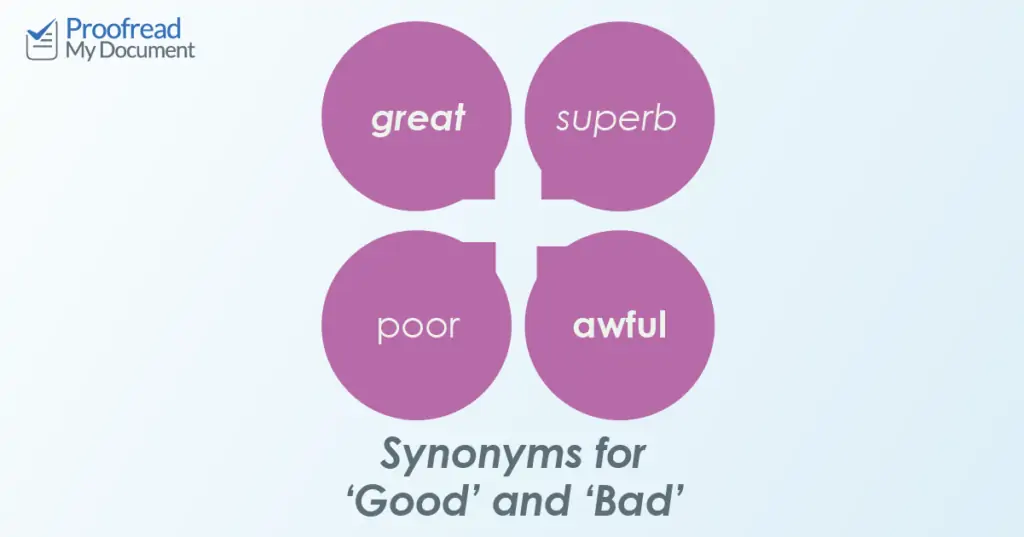The words ‘good’ and ‘bad’ are simple ways of expressing how we feel about something. However, they’re also overused, which means they can lack impact. So to make your writing more powerful and descriptive, you might need a few of the synonyms for ‘good’ and ‘bad’ detailed below.
Synonyms for ‘Good’
‘Good’ is a word with many uses, including as a noun and an adjective. We’ll focus on the adjectival uses here, where its basic meaning is ‘desirable’ or ‘of a high standard’. However, even then ‘good’ has several uses, so the best alternative will depend on what you are trying to say. Some common senses of ‘good’ and suitable synonyms can be found below, for example:
|
Definition |
Example |
Synonyms |
|
Acceptable in quality or degree | We have a good sense of how to proceed. |
Adequate, fair, satisfactory, sufficient |
|
High quality or desirable | Ghostbusters is a very good film. | Brilliant, excellent, great, outstanding, superb |
|
Useful or beneficial | Regular exercise is good for your health. | Advantageous, helpful, positive, valuable |
|
Morally good or agreeable | A good person helps those in need. | Admirable, decent, respectable, virtuous |
|
Skilled or capable | He is a very good singer. | Accomplished, proficient, skilful, talented |
|
Pleasant or pleasing | That flower smells good. | Delightful, enjoyable, nice, pleasurable, satisfying |
As the table above shows, the way to pick a ‘good’ (i.e. acceptable) synonym is to know what you are trying to say. This will often lead you to a more descriptive alternative. It is therefore important to check the definition of synonyms for ‘good’ to make sure they fit the situations.
Find this useful?
Subscribe to our newsletter and get writing tips from our editors straight to your inbox.
Synonyms for ‘Bad’
We say something is ‘bad’ to express a negative opinion. It is thus the opposite of good in all of its senses. And as with ‘good’, we have several options for how to use this word, including:
|
Definition |
Example |
Synonyms |
|
Low quality or faulty | A bad diet can cause health issues. | Deficient, inadequate, mediocre, poor |
|
Of a very low quality | Bathing in a tub of scorpions was a bad idea. | Awful, dreadful, terrible, unacceptable |
|
Harmful or negative | Smoking is bad for you. | Damaging, detrimental, injurious, unhealthy |
|
Immoral or disagreeable | Bad behaviour will be punished. | Evil, reprehensible, unpleasant, wrong |
|
Unpleasant or unwelcome | We saw the bad news on television. | Abhorrent, disagreeable, troublesome, undesirable |
There are other uses of ‘bad’ not described here, such as when we describe an injured body part (e.g. a ‘bad back’) or rotten food (e.g. ‘bad meat’). And as with ‘good’ above, this range of meanings shows that it’s important to check the definition of synonyms for ‘bad’ before you use them.
‘Good’ and ‘Bad’ in Academic Writing
It’s fine to use words like ‘good’ and ‘bad’ in academic writing, but they’re not usually enough by themselves. This is because they’re evaluative rather than descriptive. For example, if we were writing about management techniques, we might say that ‘unpaid overtime is bad for staff morale’. That is an evaluation because we say it is ‘bad’. But to demonstrate our understanding, we’d also need to explain why it is bad and how we reached that conclusion.
The answer here, then, is to remember that academic writing involves explaining our judgements. And the same applies to using words like ‘good’ and ‘bad’ in other forms of critical writing.





